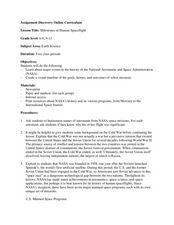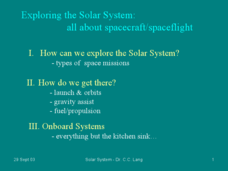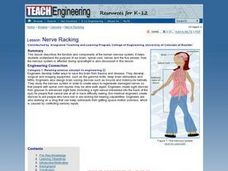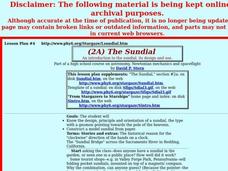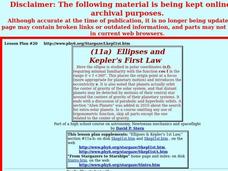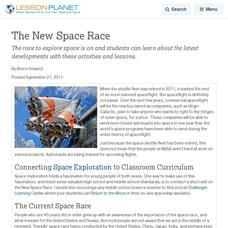Curated OER
Food for Spaceflight
When astronauts get hungry in outer space, they can't just call and have a pizza delivered. In order to gain an appreciation for the challenges associated with space travel, young learners are given the task of selecting,...
Curated OER
Milestones in Human Spaceflight
Students investigate the history and goals of NASA and human spaceflight. In this space science lesson, students answer questions about one of seven manned space programs and print pictures from the mission. As a...
Curated OER
Exploring the Solar System: All About Spacecraft/Spaceflight
Rarely do you find resources that reach high school astronomy learners. Here is something at their level! The physics of flyby missions is explained via several examples. Landing, penetrating, and roving spacecraft are examined. Diagrams...
Curated OER
Milestones of Flight
Discover seven of the most historic aircraft and spacecraft in the collections of the National Air and Space Museum. By research into the major milestones of aviation history your students will recognize features that enable flight,...
Curated OER
TE Lesson: Out of Breath
Young scholars study the parts of the human respiratory system while examining the gas exchange that takes place in the lungs. They make a model lung. They look at how the respiratory system is affected by spaceflight.
Curated OER
Nerve Racking
Fifth graders study the components and function of the nervous system. They investigate how engineers design biomedical equipment to assist the nervous system and explain how the five senses are affected during spaceflight.
Curated OER
Momentum
Students learn the concepts of momentum and its conservation, using the recoil of a cannon as an example. They examine how momentum is a vector, allowing its conservation to be applied to problems in 2 and 3 dimensions.
Curated OER
The Celestial Sphere
Students are introduced to the celestial sphere, describing its apparent rotation and the special role of the pole star.
Curated OER
Seasons of the Year
Young scholars examine how the link between the tilt of the Earth's axis to the ecliptic and seasons of the year--length of day, effectiveness of sunlight, polar day and night, and seasons south and north of the equator, as well as near it.
Curated OER
Newton's 3rd Law
Students examine how the formal definition of Newton's 3rd law: forces always originate in pairs, equal in magnitude and opposite in direction. They also examine how the informal, qualitative version: Each action has an equal and...
Curated OER
Motion in a Circle
Students explore uniform circular motion, and the relation of its frequency of N revolutions/sec with the peripheral velocity v and with the rotation period T. They examine how uniform circular motion is a type of accelerated motion.
Curated OER
Frames of Reference: The Basics
Students learn the concept of frames of reference in physics. They examine how two frames of reference, each moving with respect to the other with a constant velocity v (constant speed, constant direction).
Curated OER
Airplane flight
Students learn the basic concepts about airplane flight. They learn the reason jetliner wings are swept back and why jet engines have replaced propellers in high-speed flight.
Curated OER
Destination Outer Space
Young scholars investigate space travel. In this space travel lesson plan students examine space exploration history, engineers and scientists involved in space exploration, and Newton's third law of motion. Young scholars make...
NASA
Lights on the International Space Station
Groups explore illumination with NASA's Lighting Environment Test Facility (LETF) as a context. Using the TI-Nspire app, groups determine the lux equation that models their simulation. They then use the lux equation to...
Curated OER
Vectors
High schoolers listen to a lecture and complete a number of problems as they go. There are a variety of examples given and they are guided through the problem solving steps for each of the real-world scenarios regarding the purpose of...
Curated OER
Ellipses and Kepler's First Law
The class examines graphs in the form r = F(¿¿) in polar coordinates (r, ¿¿), in particular with the circle, ellipse and other conic sections. They determine the nature of an ellipse by studying the role of the semimajor axis and...
Curated OER
The New Space Race
The race to explore space is on and students can learn about the latest developments with these activities and lessons.
Curated OER
Top 10 Aerospace Lesson Plans
You can use these exciting aerospace lesson plans to supplement nearly any unit in your science curriculum.
Curated OER
Spaced Out
Students are introduced to the space environment. This lesson covers the major differences between the environment on Earth and that of outer space and the engineering challenges that arise because of these discrepancies. In order to...
Curated OER
Solar System Lesson Plans
Solar system lesson plans provide teachers with a multitude of ways to interest even the most reluctant learners.
Curated OER
MASS
Students distinguish between weight and mass. They examine how in oscillations of a mass against an elastic spring--in the absence of gravity, or in horizontal motion--the length of the oscillation period is proportional to the square...
Curated OER
NEWTON'S 3RD LAW
Students examine the formal definition of Newton's 3rd law: "forces always originate in pairs, equal in magnitude and opposite in direction." --The informal, qualitative version: "Each action has an equal and opposite reaction."



